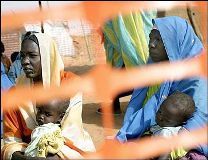Darfur rebels accept proposed compromise, Sudan govt refuses
ABUJA, Nov 5 (AFP) — Rebel leaders from the war-torn region of Darfur in west Sudan agreed to sign up to a compromise security deal proposed by the African Union, but the Sudanese government balked, hoping for amendments.

|
|
Displaced women from the Darfur region of Sudan sit under the shade of an acacia tree in the Zam-Zam camp south of El-Fasher, Sudan. (AFP). |
“We have decided to sign the security protocol as it is. Now it is up to the government of Sudan to decide. We are waiting for them,” Ahmed Mohammed Tugod, head negotiator for the Movement for Justice and Equality, told AFP.
“We’ll sign the protocol, we have accepted the text,” said Maghoub Hussain of the other Darfur rebel body, the Sudan Liberation Movement.
“But the government changed its mind and doesn’t want to sign. We are waiting for them. We’ll see who doesn’t want peace. We know they won’t sign because they don’t care about Darfur people who are African people.”
The Sudanese government delegation took part in a plenary session of the talks late Thursday but after a break it announced its decision not to ratify the compromise proposal put forward by the AU on Monday evening.
“We consider that it is not a final draft. We heven’t been consulted on certain issues, including the no-fly zone,” delegation leader Sudanese Agriculture Minister Magzoub al-Khalifa told journalists, implying that the protocol only backed the rebel positions.
After two weeks of talks in the Nigerian capital Abuja the parties remain bitterly divided over almost everything on the table, and AU officials admit that attempts to reach an agreement on security in Darfur are deadlocked.
Mediators have drawn up a proposed compromise deal to demilitarise the 20-month-old conflict — which has driven 1.5 million people from their homes — and say there is little more they can do to persuade the envoys to sign it.
“The two parties have such separate positions that we have been unable to draw up another option, for fear that the whole edifice will come crashing down,” AU co-mediator Ahmad Allam-Mi of Chad said earlier.
“We have once more issued an appeal for them to sign this compromise, which is best possible option, as a stage to advance negotiations,” he said.
The AU gave the draft “security protocol” to the warring parties on Monday, and they have come under intense international pressure to sign it in order to reinforce a shaky ceasefire and un-block stalled political talks.
The two rebel movements at the talks, while divided on much else, are united in their demand that any security deal include a clear timetable for the Khartoum government to disarm its Arab proxy militia, the Janjaweed.
Khalifa said Thursday that the rebels should be confined to barracks and that the term “Janjaweed” should be defined.
The Janjaweed have been accused by the rebels and the international community of having committed atrocities and systematic rapes against the black population of Darfur.
Meanwhile, the government has refused to accept a proposed “no-fly zone” which would have prevented Sudanese forces from launching air-raids in rebel-held areas in the west of the country.
With talks once more facing complete deadlock, the African Union pinned its hopes on the current chairman of the pan-continental body and host of the Abuja conference, President Olusegun Obasanjo of Nigeria.
Obasanjo arrived home from an Asian tour late Wednesday and AU officials said they hoped he would bring pressure to bear on the negotiating teams to reach some kind of agreement before the end of the week.
“We are thinking of closing the negotiations by the end of the week. We are currently in touch with the Nigerian government to fix a date for a signing ceremony, at least for the humanitarian protocol,” Allam-Mi said.
The wording of the humanitarian accord was agreed at a previous round of talks more than six weeks ago, and it would be seen as a failure of the AU-sponsored talks if it is the only agreement reached this month in Abuja.
Darfur has been riven with conflict since February last year when two movements launched a rebellion against Khartoum, alleging that the Arab-led government had neglected their region’s largely black African communities.
